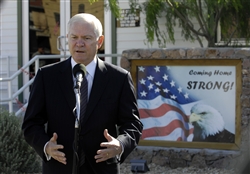Gates Works to Reduce Mental Health StigmaBy Donna Miles
American Forces Press Service
|
FORT BLISS, Texas, May 1, 2008 – Seeking mental-health care due to post-traumatic stress will no longer be seen as an obstacle to getting a government security clearance, Defense Secretary Robert M. Gates announced here today.  Video Video

Defense Secretary Robert M. Gates speaks with members of the press after touring the Restoration and Resilience Center on Fort Bliss in El Paso, Texas, May 1, 2008. Defense Dept. photo by Cherie Cullen
(Click photo for screen-resolution image);high-resolution image available. |
|
Gates announced the new policy after touring the Restoration and Resilience Center that opened in July to treat combat veterans diagnosed with post-traumatic stress disorder. The center, part of Fort Bliss’ Beaumont Army Medical Center, uses treatments ranging from group and individual therapy to yoga, acupuncture, massage, chiropractic and hot-stone therapy.
Its goal, officials at the experimental facility explained, is to help troops recover so they can stay in the Army.
Gates told reporters he had an “extraordinary experience” visiting the new center and seeing work under way to help soldiers deal with combat stress.
“They are doing some amazing things here in terms of helping soldiers who want to remain soldiers but who have been wounded with post-traumatic stress disorder,” he said. “It is a multi-month effort by a lot of caring people, and they are showing some real success in restoring these soldiers.”
Gates said he’ll take the idea of possibly replicating Fort Bliss’ prototype program to other posts.
He also noted other techniques being developed in the combat theater to give troops additional tools to deal with the circumstances they face. “These are clearly worth additional attention as well,” he told reporters.
Gates called additional resources and capabilities to treat troops dealing with PTSD just one aspect of a two-part effort.
“The second, and in some ways equally challenging, is to remove the stigma that is associated with PTSD and to encourage soldiers, sailors, Marines and airmen who encounter these problems to seek help,” he said.
But he acknowledged that not every soldier returning from Iraq and Afghanistan is getting the treatment they need. He cited an Army inspector general report’s findings that troops often forgo mental-health care because they’re concerned it could prevent them from getting a security clearance and potentially could damage their careers.
Gates cited “Question 21” on Standard Form 86, the government security-clearance form that specifically asks applicants whether they have ever received treatment for mental-health issues.
The question asks if the person has consulted with a mental-health professional or other health-care provider during the past seven years about a mental-health related condition.
Respondents who answer “yes” must provide dates of treatment and the provider’s name and address.
“For far too long and for far too many, this question has been an obstacle to care,” the secretary said.
The Defense Department has been working with other agencies for eight months to strike a balance that enables troops to get the treatment they need and the intelligence community to get the information it needs, he said.
“It took longer than I would have hoped, but it is done,” Gates said. “Now it is clear to people who answer that question that they can answer ‘no’ if they have sought help to deal with their combat stress in general times.”
New language for “Question 21” asks if the person consulted with a health-care professional during the past seven years regarding an emotional or mental health condition. It specifies, however, that the answer should be “no” if the care was “strictly related to adjustments from service in a military combat environment.”
Gates directed in a policy letter dated April 18 that the revised language be used by anyone completing the SF 86 form.
A letter being distributed throughout the military explains the new policy and its rationale.
“Seeking professional care for these mental health issues should not be perceived to jeopardize an individual’s security clearance,” states the memo, co-signed by Undersecretary for Intelligence James R. Clapper Jr. and Undersecretary for Personnel and Readiness David S.C. Chu.
“On the contrary,” they wrote, “failure to seek care actually increases the likelihood that psychological stress could escalate to a more serious mental condition, which could preclude an individual from performing sensitive duties.”
The letter urges men and women in uniform who are exhibiting symptoms of PTSD to seek help and makes clear that this is not going to put their security clearances or their careers in jeopardy, he said.
“The most important thing for us now is to get the word out as far as we can to every man and woman in uniform to let them know about the change, to let them know the efforts under way, to remove the stigma and to encourage them to seek help when they are in the theater or when they return from the theater,” Gates said. “So this is a very important issue for us.
“We have no higher priority in the Department of Defense, apart from the war itself, than taking care of our men and women in uniform who have been wounded -- who have both visible and unseen wounds,” he said.
Gates called the new Restoration and Resilience Center an example of new approaches the military is taking to provide that care. “This center here is illustrative of what can be done,” he said.
Thirty-six volunteers participating in the program, all diagnosed with PTSD after serving in Iraq or Afghanistan, receive care that combines group and individual therapy sessions with meditation, yoga, acupuncture, massage therapy, chiropractic and hot-stone therapy treatments.
“They are all volunteers,” Gates said. “They all come here because they want to.”
|
|